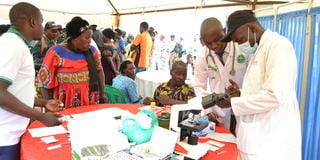Prime
Mengo, activists demand inclusive health services at public facilities for PWDs

Medics attend to people living with disabilities at a health camp held in Luweero District on July 10, 2024. PHOTO BY DAN WANDERA
What you need to know:
While establishing specialized health facilities for persons with disabilities across the country might be costly and challenging, recruiting sign language interpreters and providing accessibility facilities at health units can help reduce the burden
The lack of inclusive services, including sign language interpreters and accessibility facilities, at healthcare centers is a significant challenge for people living with disabilities in Uganda, rights activists say.
While establishing specialized health facilities for persons with disabilities across the country might be costly and challenging, recruiting sign language interpreters and providing accessibility facilities at health units can help reduce the burden.
Dr Vincent Ssinabulya, Chairperson of the Buganda Kingdom Disability Council, estimates that over 80% of healthcare facilities in the country lack trained sign language interpreters.
"We are in a country where previous statistics show that we have over two million people living with disabilities, but our healthcare facilities are yet to become inclusive. We don't have sign language interpreters in many facilities," he said during the 9th disability awareness camp in Luweero District on Wednesday.
Many persons with disabilities, including those with Hydrocephalus complications, cannot access healthcare facilities due to transport costs.
"The known facilities, like Cure Hospital in Mbale District, are not accessible to patients who have to travel hundreds of kilometers from different districts," said Mr Benjamin Kauma, an administrative assistant at Spina-Bafida and Hydrocephalus Association of Uganda.
"We are challenged that many people living with Hydrocephalus disease fail to access healthcare services," he added.
Ms Mariam Mayanja Nkalubo, the Kingdom Minister for Gender, Water, and Environment in the Buganda Kingdom, said the kingdom has partnered with the Central Government, civil society organizations, and non-governmental organizations to boost healthcare service delivery targeting women, youth, children, and people living with disabilities.
"Buganda Kingdom has initiated health awareness campaigns targeting people living with disabilities and programs like low-cost housing for the elderly and other vulnerable groups," said Ms Teddy Nabakooza, a program coordinator under the Gender Ministry, representing Ms Nkalubo.
The Greater Luweero area has a higher percentage of people living with disabilities, according to activists. Ms Florence Namaganda, an activist with the persons living with disability organization under Mukisa Foundation, said the 9th disability awareness camp targeted healthcare services for the many disabled persons in the greater Luweero area.
"We are blessed that over 1,000 people living with disabilities accessed healthcare at the one-day health camp. These people face multiple health complications. Many cannot access healthcare units due to poverty and an unfriendly service delivery system," she said.
Dr Innocent Nkonwa, the Luweero District Health Officer, said sign language interpreters are not available in all health facilities in the district, but healthcare workers are obligated to provide services without discrimination. "The new facilities, including the old building, are now fixed with user-friendly facilities to accommodate people living with disabilities," he said.
Luweero District had an estimated 6,424 persons living with disabilities in 2018, according to district statistics.





